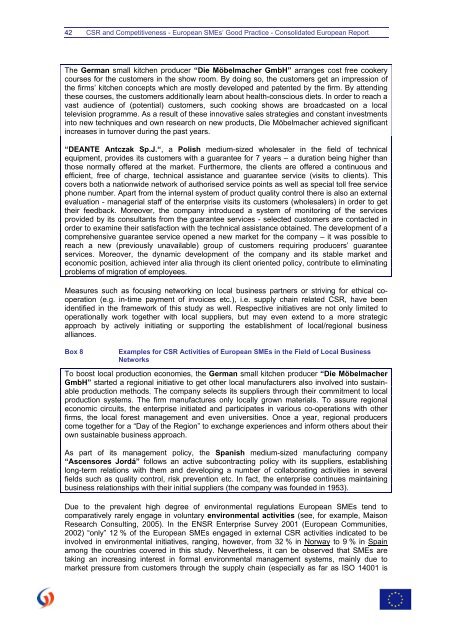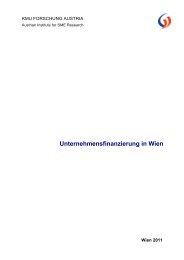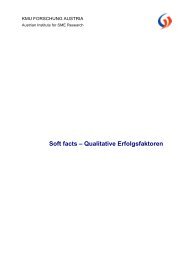CSR and Competitiveness European SMEs - KMU Forschung Austria
CSR and Competitiveness European SMEs - KMU Forschung Austria
CSR and Competitiveness European SMEs - KMU Forschung Austria
Create successful ePaper yourself
Turn your PDF publications into a flip-book with our unique Google optimized e-Paper software.
42 <strong>CSR</strong> <strong>and</strong> <strong>Competitiveness</strong> - <strong>European</strong> <strong>SMEs</strong>’ Good Practice - Consolidated <strong>European</strong> Report<br />
The German small kitchen producer “Die Möbelmacher GmbH” arranges cost free cookery<br />
courses for the customers in the show room. By doing so, the customers get an impression of<br />
the firms’ kitchen concepts which are mostly developed <strong>and</strong> patented by the firm. By attending<br />
these courses, the customers additionally learn about health-conscious diets. In order to reach a<br />
vast audience of (potential) customers, such cooking shows are broadcasted on a local<br />
television programme. As a result of these innovative sales strategies <strong>and</strong> constant investments<br />
into new techniques <strong>and</strong> own research on new products, Die Möbelmacher achieved significant<br />
increases in turnover during the past years.<br />
“DEANTE Antczak Sp.J.“, a Polish medium-sized wholesaler in the field of technical<br />
equipment, provides its customers with a guarantee for 7 years – a duration being higher than<br />
those normally offered at the market. Furthermore, the clients are offered a continuous <strong>and</strong><br />
efficient, free of charge, technical assistance <strong>and</strong> guarantee service (visits to clients). This<br />
covers both a nationwide network of authorised service points as well as special toll free service<br />
phone number. Apart from the internal system of product quality control there is also an external<br />
evaluation - managerial staff of the enterprise visits its customers (wholesalers) in order to get<br />
their feedback. Moreover, the company introduced a system of monitoring of the services<br />
provided by its consultants from the guarantee services - selected customers are contacted in<br />
order to examine their satisfaction with the technical assistance obtained. The development of a<br />
comprehensive guarantee service opened a new market for the company – it was possible to<br />
reach a new (previously unavailable) group of customers requiring producers’ guarantee<br />
services. Moreover, the dynamic development of the company <strong>and</strong> its stable market <strong>and</strong><br />
economic position, achieved inter alia through its client oriented policy, contribute to eliminating<br />
problems of migration of employees.<br />
Measures such as focusing networking on local business partners or striving for ethical cooperation<br />
(e.g. in-time payment of invoices etc.), i.e. supply chain related <strong>CSR</strong>, have been<br />
identified in the framework of this study as well. Respective initiatives are not only limited to<br />
operationally work together with local suppliers, but may even extend to a more strategic<br />
approach by actively initiating or supporting the establishment of local/regional business<br />
alliances.<br />
Box 8 Examples for <strong>CSR</strong> Activities of <strong>European</strong> <strong>SMEs</strong> in the Field of Local Business<br />
Networks<br />
To boost local production economies, the German small kitchen producer “Die Möbelmacher<br />
GmbH” started a regional initiative to get other local manufacturers also involved into sustainable<br />
production methods. The company selects its suppliers through their commitment to local<br />
production systems. The firm manufactures only locally grown materials. To assure regional<br />
economic circuits, the enterprise initiated <strong>and</strong> participates in various co-operations with other<br />
firms, the local forest management <strong>and</strong> even universities. Once a year, regional producers<br />
come together for a “Day of the Region” to exchange experiences <strong>and</strong> inform others about their<br />
own sustainable business approach.<br />
As part of its management policy, the Spanish medium-sized manufacturing company<br />
“Ascensores Jordá” follows an active subcontracting policy with its suppliers, establishing<br />
long-term relations with them <strong>and</strong> developing a number of collaborating activities in several<br />
fields such as quality control, risk prevention etc. In fact, the enterprise continues maintaining<br />
business relationships with their initial suppliers (the company was founded in 1953).<br />
Due to the prevalent high degree of environmental regulations <strong>European</strong> <strong>SMEs</strong> tend to<br />
comparatively rarely engage in voluntary environmental activities (see, for example, Maison<br />
Research Consulting, 2005). In the ENSR Enterprise Survey 2001 (<strong>European</strong> Communities,<br />
2002) “only” 12 % of the <strong>European</strong> <strong>SMEs</strong> engaged in external <strong>CSR</strong> activities indicated to be<br />
involved in environmental initiatives, ranging, however, from 32 % in Norway to 9 % in Spain<br />
among the countries covered in this study. Nevertheless, it can be observed that <strong>SMEs</strong> are<br />
taking an increasing interest in formal environmental management systems, mainly due to<br />
market pressure from customers through the supply chain (especially as far as ISO 14001 is




